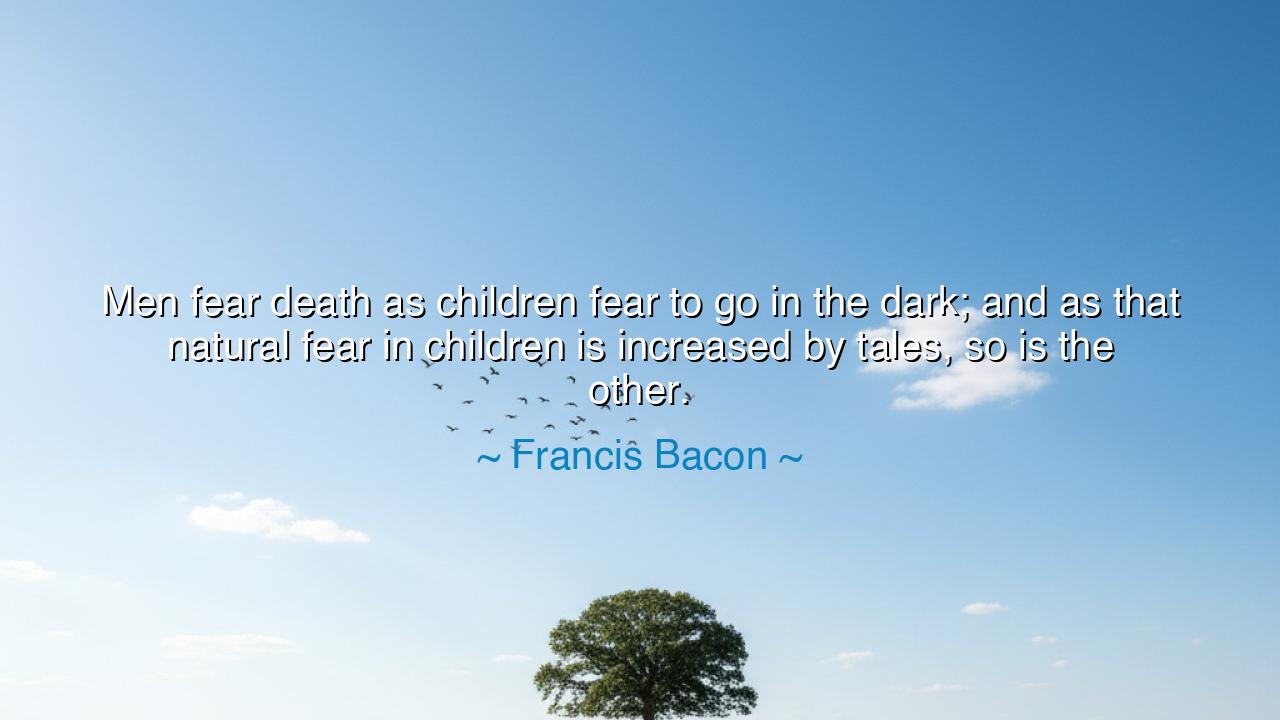
Men fear death as children fear to go in the dark; and as that
Men fear death as children fear to go in the dark; and as that natural fear in children is increased by tales, so is the other.






“Men fear death as children fear to go in the dark; and as that natural fear in children is increased by tales, so is the other.” — so spoke Francis Bacon, the great English philosopher of the Renaissance, whose wisdom bridged the worlds of faith and reason. His words, though centuries old, strike still with timeless clarity. In them, he reveals the frailty of the human heart: that our greatest fears are often born not of truth, but of imagination — that death, like the dark, is not inherently terrible, but made terrifying by the stories we whisper about it.
Bacon’s origin of thought came from a life steeped in the study of human nature. He observed that mankind, for all its wisdom and progress, remained enslaved to superstition. In his essay “Of Death,” he wrote these words to show that fear of death is not a mark of reason but of ignorance — the same ignorance that makes a child tremble at shadows. For just as a child fears the dark because he cannot see what lies within it, so do men fear death because they cannot see what lies beyond. The fear itself is natural, but it is magnified by tales, by the teachings of dread, by the myths and imaginations that turn mystery into terror.
The dark was, to the ancient mind, a symbol of the unknown — and so is death to every living being. Yet Bacon teaches us that this fear grows not from the darkness itself, but from the fictions we attach to it. A child’s fear deepens when he is told of ghosts lurking in the night; a man’s fear swells when he hears of eternal punishment or endless nothingness. The mind, which could be the lantern that dispels darkness, instead feeds the flame of its own anxiety. And thus, the wise man learns to question his fear — to ask whether it comes from truth or from the tales told to him by others.
Consider the example of Socrates, who, condemned to die, faced death with calm and grace. When his friends wept, he said, “Shall I fear what I do not know?” He saw that death, like sleep, was a mystery, and that to fear it blindly was to live half-alive. In the moment when he drank the hemlock, he was freer than his accusers, for he had mastered the great illusion — that death is the enemy. Socrates, like Bacon, understood that it is not death that enslaves us, but fear, and that fear itself is a creature of the mind’s own making.
And yet, Bacon does not condemn fear altogether. He recognizes it as natural, as part of the human inheritance. The child cannot help but fear the dark — nor can man help but tremble before the unknown. But the lesson is this: we must not feed our fears with fables. The child who learns that the dark holds no monster walks freely into the night; the man who learns that death is not to be dreaded, but accepted, walks freely through life. The wise do not deny fear, but they rise above it — turning it from master to teacher.
Bacon’s insight reveals a deeper truth: that most of our suffering comes not from reality, but from our imagination of it. Just as storytellers once frightened children to keep them near the fire, so too have priests, kings, and philosophers at times used the specter of death to control the hearts of men. But the enlightened soul, the one who seeks truth, learns to walk into the dark alone — not with arrogance, but with trust that what awaits is part of nature’s order. For death, far from being the destroyer, is merely the rest after labor, the silence after song, the closing of the book whose words have already been written.
Therefore, my listener, take this teaching as a torch to carry into your own darkness. When fear rises — whether it is fear of death, of failure, or of loss — ask yourself: Is this fear born of truth, or of tales? Learn to see with the eyes of the philosopher, who knows that the unknown is not always the enemy, but often the frontier of wisdom. Remember that every shadow disappears when light is brought near — and that light is knowledge. Seek understanding, and fear will lose its hold.
For Francis Bacon teaches not the denial of death, but the acceptance of life. The child becomes a man when he no longer trembles at the dark; the man becomes wise when he no longer trembles at the end. And so, walk bravely through both — the night and the mystery — knowing that what lies beyond is but another form of light unseen. Fear will whisper, but courage will answer: The dark holds nothing I cannot face.






AAdministratorAdministrator
Welcome, honored guests. Please leave a comment, we will respond soon